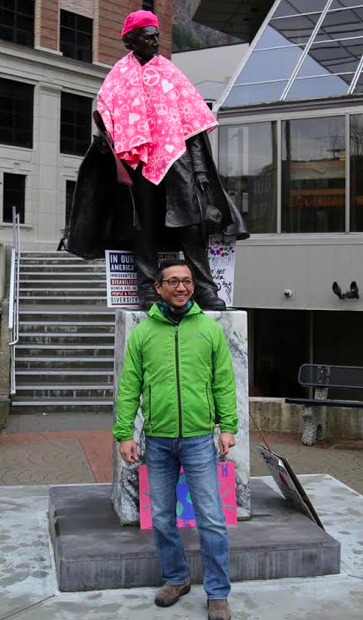Photo: House District 4 candidate Jim Sackett speaks to supporters at Compeau’s in Fairbanks at a fundraising event attended by about 100 people.
REPUBLICANS LIKE SEN. KELLY WINNING THE MEET-AND-GREETS
The 30-day financial reports to the Alaska Public Offices Commission were due July 23, and tell much of the strength of the support for candidates as they head into the last month before the Aug. 21 primary election.
Fairbanks Republicans in competitive races raised significantly more cash to get out their message to potential voters.
It takes both cash and creativity in Fairbanks, where you have to get the yard signs in the ground in summer, before freezing weather takes over. Walking door-to-door in October is difficult in this spread-out community.
Right now, observers say the campaign signs in Fairbanks already have a heavy Republican presence. That’s reflected in the cash reports, too.
Between the House and Senate candidates in Fairbanks, more than $274,000 was raised for their Republican effort.
The Democrats and petition candidates in the Golden Heart City have raised $147,489; the lion’s share of that was raised by Rep. Scott Kawasaki, now running for Senate Seat A.

SENATE SEAT A
Sen. Pete Kelly, the incumbent who had over $71,000 in the year-start report, added another $48,000 for a total of $119,474.
Kelly has no primary competition, good name recognition and stellar reputation as Senate President as the one who said early on said the Senate would never yield on an income tax.
Rep. Scott Kawasaki, a Democrat who favored an income tax, is challenging the Senate seat; he had $48,540 in his year-start report, and put $41,253 more in the bank, for a strong showing of $89,793.
“This is the marquee race for the State Senate and it’s where the Democrats are putting their effort. Pete Kelly is their prime target,” said Tuckerman Babcock, chairman of the Alaska Republican Party. “Without Sen. Kelly, we would probably have an income tax in Alaska right now.”
SENATE SEAT C
Sen. Click Bishop, the incumbent, added $3,000 to his campaign, and brings his total to $22,375. He is unopposed this cycle in both the Primary and General Election.
HOUSE DISTRICT 1
Bart LeBon, running for District 1 with weak primary competition from Wolfgang Falke, raised $45,479 since the year-start report for a total campaign purse of $70,854.
The District 1 seat is being vacated by Democrat Scott Kawasaki.
Democrat challenger Kathryn Dodge and liberal petition candidate PJ Simon are also in the race. The district leans Republican, but the voters sometimes elect Democrats. Dodge had raised $27,569 in the year-start report, added $39,080 in the 30-day report for a total of $66,649. However, many of her contributions are from herself. Simon reported no funds raised at all.
HOUSE DISTRICT 2
Rep. Steve Thompson, the incumbent running for reelection, raised $4,300, for a total of $14,452 since his year-start report. He has no primary challenger and is in a favored Republican seat.
Van Lawrence is the Democrat challenger who has raised $7,967, and spent $5,800.
HOUSE DISTRICT 3
Rep. Tammie Wilson, the Republican running unopposed for her North Pole seat, raised a conservative $251 in her 30-day report, for a total of $1,353 since the year-start report.
HOUSE DISTRICT 4
Jim Sackett, a Republican running for the first time, raised $43,196.
Sackett has no primary opponent and had not filed for office in time for a year-start report, so this represents his entire fundraising effort.
The District 4 seat is being vacated by Democrat Rep. David Guttenberg.
Grier Hopkins, a well-known Democrat and son of former Borough Mayor Luke Hopkins, is running for the District 4 seat and has raised $32,812, with 200 donors listed. Petition candidate Tim Lamkin reported raising $250.
HOUSE DISTRICT 5
Kevin McKinley, running as a newcomer, raised $6,834 but has spent $4,122. The moderate Republican faces no primary opponent. McKinley owns several tattoo businesses.
Rep. Adam Wool, the incumbent Democrat and bar owner, started the year with $12,579, and has raised another $9,894. But he has spent all but $4,775.
HOUSE DISTRICT 6
Rep. Dave Talerico, the Republican incumbent, raised $6,200 in his 30-day report. He had no year-start report because he had not filed for reelection in time.
His challenger in the General Election, Ed Alexander, a Democrat, has raised more than twice that: $13,548.
FUNDRAISING IN FAIRBANKS
Fairbanks is a generous community but usually not in the $500 max-out level for races, as set by Alaska law. Kelly’s strong showing in fundraising is impressive, but so is the purse of Rep. Kawasaki.
Although he has a playboy reputation in Juneau, Kawasaki is an avid campaigner and is well-liked by his District 1 constituents.

In Sen. Pete Kelly’s race against Sen. Joe Paskvan in 2012, he raised nearly $80,000 by election night. This year, he’s surpassed that by nearly $40,000 in July.
The issue will come down to taxes: In this community, the income tax favored by Rep. Kawasaki struck home with voters.
House Democrats went so far as to pass an income tax bill, HB 115, on April 15, 2017 — the day that Alaskans had to file their federal taxes. It was a bill that created an almost mirror agency of the IRS, with complicated formulas and severe penalties for errors and omissions.

The state was in the midst of a serious recession with the highest unemployment in the nation. The previous year the state had lost 9,000 jobs, with more to come, and Fairbanks had been hit hard.
Fairbanks may be especially sensitive to taxation because it’s an expensive place to live, with a high cost of heating fuel.
But for Democrats to flip the Senate as they flipped the House to Democrat control, they’ll need to get Kawasaki to beat Kelly, which is why this race is shaping up to be a “real knuckle-duster,” as one Fairbanks observer put it.